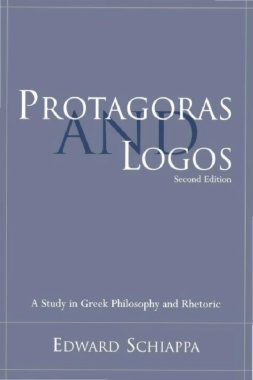Reassesses the philosophical and pedagogical contributions of Protagoras
Protagoras and Logos brings together in a meaningful synthesis the contributions and rhetoric of the first and most famous of the Older Sophists, Protagoras of Abdera. Most accounts of Protagoras rely on the somewhat hostile reports of Plato and Aristotle. By focusing on Protagoras's own surviving words, this study corrects many long-standing misinterpretations and presents significant facts: Protagoras was a first-rate philosophical thinker who positively influenced the theories of Plato and Aristotle, and Protagoras pioneered the study of language and was the first theorist of rhetoric. In addition to illustrating valuable methods of translating and reading fifth-century B.C.E. Greek passages, the book marshals evidence for the important philological conclusion that the Greek word translated as rhetoric was a coinage by Plato in the early fourth century.
In this second edition, Edward Schiappa reassesses the philosophical and pedagogical contributions of Protagoras. Schiappa argues that traditional accounts of Protagoras are hampered by mistaken assumptions about the Sophists and the teaching of the art of rhetoric in the fifth century. He shows that, contrary to tradition, the so-called Older Sophists investigated and taught the skills of logos, which is closer to modern conceptions of critical reasoning than of persuasive oratory. Schiappa also offers interpretations for each of Protagoras's major surviving fragments and examines Protagoras's contributions to the theory and practice of Greek education, politics, and philosophy. In a new afterword Schiappa addresses historiographical issues that have occupied scholars in rhetorical studies over the past ten years, and throughout the study he provides references to scholarship from the last decade that has refined his views on Protagoras and other Sophists.
- Cover
- Title Page
- Copyright Page
- Dedication Page
- Table of Contents
- Preface to the Second Edition
- Preface to the First Edition
- Acknowledgments
- Translations and Abbreviations
- Part I: Prolegomenon to the Study of Early Greek Rhetorical Theory
- Chapter 1: Why a Study of Protagoras?
- Defining "Sophist"
- Protagoras' Significance
- Chapter 2: Interpreting Ancient Fragments
- Problems Facing the Modern Interpreter
- Literacy and Greek Philosophy
- Four Hermeneutic Principles
- Chapter 3: The "Invention" of Rhetoric
- Did Plato Coin Rhêtorikê?
- The "Invention" Myths Reconsidered
- Sophistic Teaching Reconsidered
- Chapter 4: Toward an Understanding of Sophistic Theories of Rhetoric
- Historical Reconstruction and Contemporary Appropriation
- Poulakos' Sophistic Definition of Rhetoric
- Toward Individualistic Studies of the Sophists
- Part II: Analysis of the Major Fragments of Protagoras
- Chapter 5: The Two-Logoi Fragment
- The Subjective and Heraclitean Interpretations
- The Advancement of Heraclitean Thought
- Translation and Interpretation
- Chapter 6: The "Stronger and Weaker" Logoi Fragment
- The Pejorative Interpretation
- The Positive Interpretation
- The Evidence of Aristophanes' Clouds
- Protagoras' Influence on Plato and Aristotle
- Chapter 7: The "Human-Measure" Fragment
- Reconsidering the Standard Translation
- The Fragment as a Response to Parmenides
- A Defense of Relativity
- Chapter 8: The "Impossible to Contradict" Fragment
- Competing Interpretations of Ouk Estin Antilegein
- Positive Contributions of Ouk Estin Antilegein
- Chapter 9: The "Concerning the Gods" Fragment
- Agnosticism or Anthropology?
- Two More Protagorean Fragments
- Part III: Protagoras and Early Greek Philosophy and Rhetoric
- Chapter 10: Protagoras and Fifth-Century Education
- The Mythic-Poetic Tradition
- Providing a Logos of Logos
- Protagoras and Civic Aretê
- Chapter 11: Protagoras, Logos, and the Polis
- Protagoras and Periclean Democracy
- Protagoras' Vision of the Polis
- Chapter 12: Protagoras "versus" Plato and Aristotle
- The Refutation of Protagoras
- Rejection or Assimilation?
- Chapter 13: Protagoras' Legacy to Rhetorical Theory
- Summary of Contributions
- Conclusion
- Afterword
- Rhetorical Salience and Role of Theory
- Plato, Rhêtorikê, and the Sophists
- Appendix A: Chronology of Protagoras' Life
- Appendix B: Data from the TLG Search for ρητορικ
- Appendix C: Three Spurious Attributions
- Bibliography
- Index

